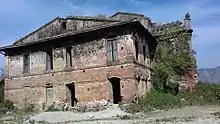
Garva Palace (Nepali: गर्भा दरबार) is a historical site located in Chure Rural Municipality in Kailali district of western Nepal. Currently, the palace is in derelict condition due to lack of necessary conservation.[1] The palace is spread over 10 Ropanis of land.[2][3]
History
The palace was built by Khadga Shamsher Jang Bahadur Rana between 1979 and 1984 BS.[4] Special craftsmen were brought from India to build the palace.[2] The palace used to serve the purpose of collecting taxes and settling cases in Kailali, Kanchanpur and Doti districts.[1] Later, the Palace was used by Bahadur Shumsher, son of Khadak Shumsher.[5]
After the Rana reign was over, a post office and a village development committee office was set up in the palace. During the civil war, Maoist set fire in the palace. Since then the building has been uninhabited.
Currently, most of the doors and windows of the palace have been damaged.
Architecture
The palace is three-storey tall. It has 83 carved wooden windows and 53 doors.[6] The walls are painted with artistic figures.[2] There is a tunnel in the palace for security purposes.[4][5]
Conservation effort
Sudurpashchim Province government has allocated budget for renovation of the palace. However, no work has been done so far.[1][7]
The locals have rallied across the country to highlight the need of renovation.[8]
See also
References
- 1 2 3 Sureis (2019-12-10). "Garva Durbar awaiting conservation". The Himalayan Times. Retrieved 2021-02-12.
- 1 2 3 "Historic palaces in Doti lie in dilapidated condition". Retrieved 2021-02-13.
- ↑ Periodic District Development Plan. District Development Committee Kailali. 2015. p. 4,25.
- 1 2 "संरक्षणको पर्खाइमा गर्भा दरबार, सडक सञ्जालमा जोडियो". Retrieved 2021-02-13.
- 1 2 "चुरे क्षेत्रको राणाकालीन गर्भा दरबार जीर्ण बन्दै". Nepal Samaya. Retrieved 2021-02-13.
- ↑ "८३ झ्याल र ५३ ढोका भएको राणाकालीन गर्भा दरबार जीर्ण". Online Khabar. Retrieved 2021-02-13.
- ↑ "गर्भा दरबार क्षेत्र सडक सञ्जालमा | Ratopati". Retrieved 2021-02-13.
- ↑ "'गर्भा दरबार' चिनाउन साइकल यात्रा". Setokhari. Retrieved 2021-02-13.